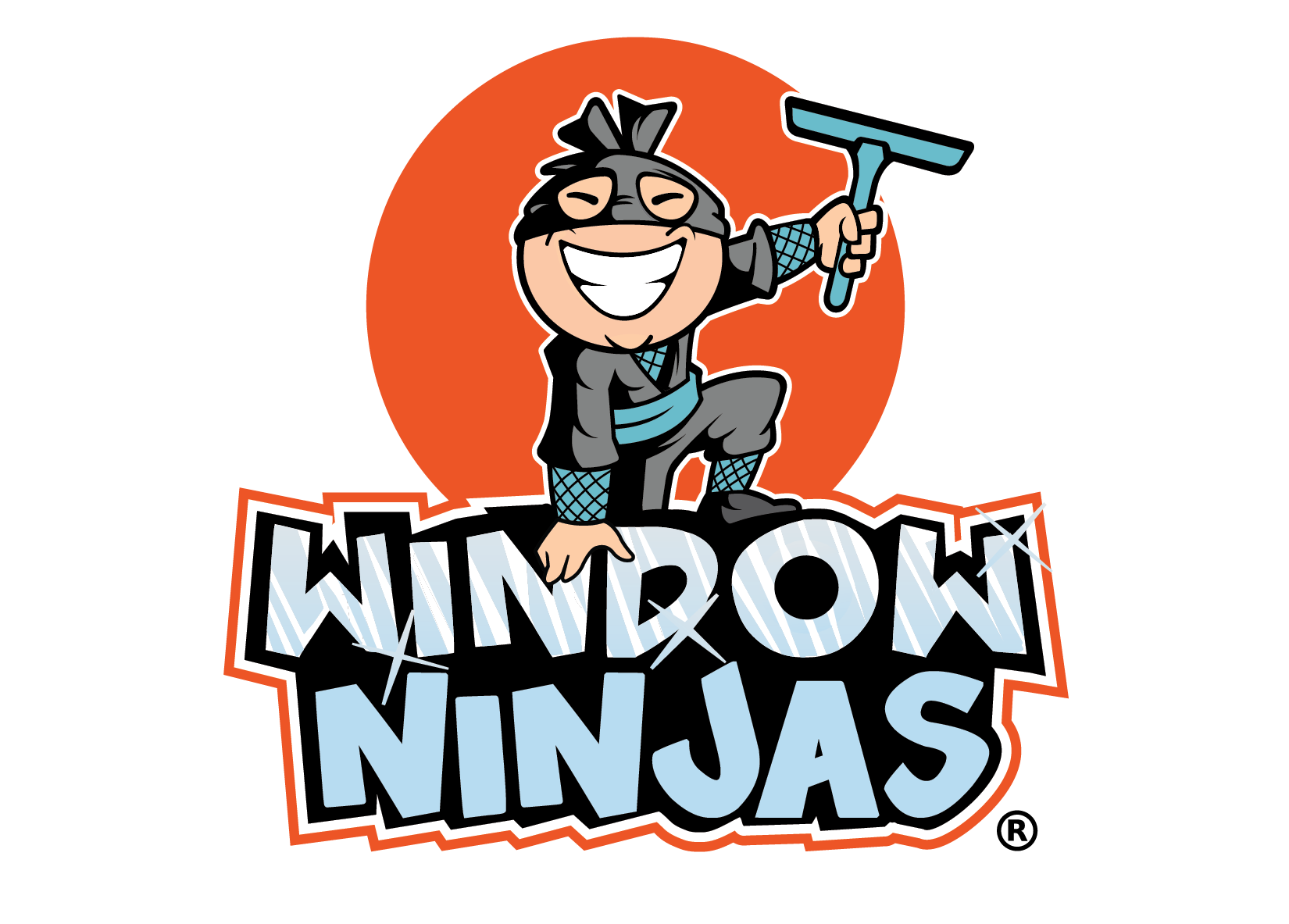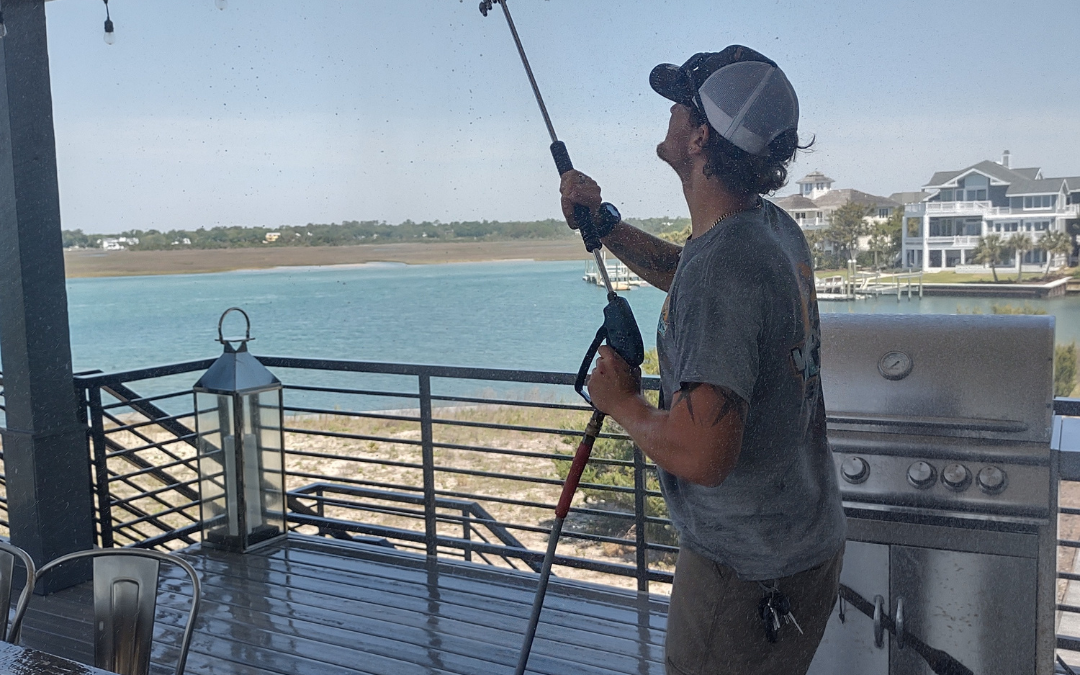Choosing the right cleaning method is crucial when it comes to maintaining the exterior of your home or business. Have you ever wondered what the difference between pressure and soft washing is? Often lumped together, these cleaning techniques serve unique purposes and use different approaches to care for various surfaces. But what sets them apart, and how do you know which method is best for your property?
In this article, we here at Window Ninjas are diving into the intricacies of pressure washing and soft washing. We are exploring how they work, their benefits, and when to use each method to keep your outdoor spaces pristine.
Is soft washing safer for all types of siding? Can pressure washing damage your driveway? We will find out!
What is Pressure Washing?

The pressure washing process begins with the machine taking in water from a source and then accelerating it. This is done through a pump powered by either an electric motor or a gas engine. The pump intensifies the water pressure and is then ejected through a specialized hose and nozzle, allowing the user to direct the high-pressure stream precisely where needed. Users can choose different types of nozzles, which vary the water jet’s size and shape to suit specific cleaning tasks – from wide fan-like sprays for large areas to pencil-thin streams for heavy-duty spot-cleaning.
While pressure washers are highly effective for surface preparation and cleaning hard substances like concrete and metal, they can be too harsh for softer or more delicate surfaces, potentially causing damage. Therefore, selecting the appropriate pressure level and nozzle for the task at hand is essential. This ensures the safety and preservation of the surface being cleaned.
What is Soft Washing?
Soft washing is a gentle yet effective cleaning technique used widely for exterior cleaning tasks, particularly on surfaces that could be damaged by high-pressure washing. This method employs a low-pressure water
The process involves applying biodegradable chemical detergents at low pressure to the target area. This breaks down the dirt and kills any microorganisms. After a short dwell time, the solution is rinsed off with a gentle water stream, safely washing away the dislodged grime and residue. This approach ensures that the structural integrity and appearance of the surface are maintained without the potential abrasiveness of high-pressure jets.
Soft washing conserves more water than pressure washing, and the cleaning effects last significantly longer. In fact, it lasts about four to six times longer than what you would expect from pressure washing. Moreover, soft washing is particularly favored for its ability to provide a deep clean without the risk of water damage or stripping paint and finishes from surfaces. It’s a suitable technique for residential and commercial buildings, where maintaining aesthetics and material longevity is essential.
What are the Differences Between the Two?

Professional pressure washing uses high-pressure water jets to blast tough stains, dirt, and debris away. This service is ideal for handling resilient materials like concrete, brick, and stone. These materials can withstand the strong force of the water. Professionals use commercial-grade equipment that allows them to control the pressure accurately. This minimizes the risk of damage while maximizing cleaning efficiency. This method effectively removes loose paint, mold, grime, dust, mud, and even chewing gum from sidewalks and driveways. Surfaces like parking lots, decks, and patios can also benefit from professional pressure washing. The powerful stream penetrates deeply into the crevices for an extremely thorough clean.
Conversely, professional soft washing is particularly suitable for more delicate surfaces that high pressures, such as roof tiles, window screens, and softwood decking, would damage. It relies on eco-friendly chemical solutions to treat and clean surfaces, ensuring no damage occurs during the process. These chemicals clean, sanitize, and treat surfaces to inhibit future growth of algae, fungi, and bacteria.
Since the water pressure used is considerably lower than traditional pressure washing, it greatly reduces the risk of water infiltration under siding or shingles and other water damage-related issues. Professional soft washers are trained to identify the correct cleaning agents and application techniques for various surfaces. This ensures a safe yet effective clean.
How Do I Know Which Method to Use?
Understanding the best cleaning method for a property, be it pressure washing or soft washing, often depends on the specific needs of the property and the type of surfaces that require cleaning. Property owners should
Pressure washing is best suited for hard, non-porous surfaces that can handle high-pressure water streams without damage. These include concrete driveways, stone pathways, brick walls, and sturdy decks. It’s particularly effective for removing stubborn stains, such as oil spills, and is great for preparing surfaces for painting or sealing.
Soft washing, however, is ideal for more delicate areas where high pressure could cause harm. This includes surfaces like roof shingles, siding, softwood, and exterior furniture that might sustain damage from the high pressure. Soft washing not only cleans but also treats the surfaces, helping to protect against future biological growth.
Property owners should also consider the nature of the contaminants. If the issue is more related to biological growth—such as mold, algae, or mildew—a soft wash may be more effective. This is due to the cleaning solutions used that target these problems at their source.
Consulting with professional cleaning service providers can also be invaluable. Professionals know to evaluate the condition of your property’s surfaces. They understand the local environmental conditions, and recommend the safest and most effective cleaning method. They can also advise on any local regulations regarding chemical use and water runoff, which is crucial when using detergents in the soft wash process.
Final Thoughts
In conclusion, the choice between pressure washing and soft washing is significant. Each method offers distinct benefits for differing surface types and cleaning needs. For property owners in Greenville, SC, the most reliable way to ensure your property is treated correctly is to call on experienced professionals.
The team at Window Ninjas possess the expertise necessary to assess your property’s unique requirements and recommend the appropriate solution. By entrusting this decision to Window Ninjas, you have peace of mind knowing that your property will be cleaned effectively and maintained with utmost care. Call us today at 864-558-7758 or visit our website at windowninjas.com for more information or to schedule an appointment! Keep shining!

